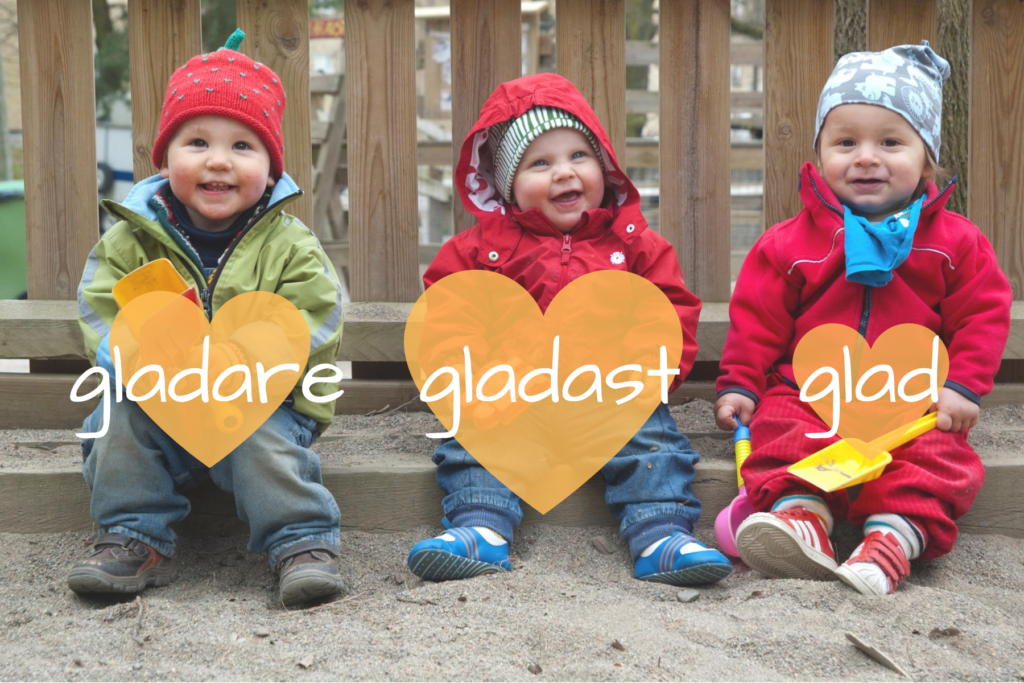Happy, Happier, Happiest – Comparing Adjectives in Swedish Posted by Chelsea B on Jul 31, 2020 in Culture, Grammar, Swedish Language, Vocabulary
Glad, gladare, gladast! Happy, happier, happiest! The endings for comparative and superlative follow a pattern in Swedish, it’s pretty straightforward, hurra! I’ll introduce some of the regular adjectives this week, and cover the irregular bunch in two weeks. This post was inspired by a reader’s comment on a blog a few weeks back. I love suggestions, so let me know what you would like to see!
Let’s love up on our Swedish adjectives! We know that adjectives are formed based on en, ett, and plural nouns, but what about if something is taller, shorter, more expensive, etc? That’s the comparative form. Most adjectives can be compared, and the regular ones follow a quite simple pattern.
Take the base form of the adjective, for this example, let’s use fin, or “nice”. Add the ending –are –> finare for “nicer”. Add -ast –> finast for “nicest”.
These first two endings work when you are describing an indefinite, or obestämd noun.
For example:
Ulfs lägenhet är finare än min. Ulf’s apartment is nicer than mine.
Ulfs lägenhet är fin än min, men Henriks är finast.
Ulf’s apartment is nicer than mine, but Henrik’s is nicest.
If you’d like to describe a definite, or bestämd noun, add -aste –> finaste.
Det finaste huset ligger på Norrgatan. The nicest house is on Norrgatan.
*Note here that you’ve got to use the definite form of the noun, in this case huset, and it’s accompanying article, den for en-category nouns, det, for ett category nouns, and de for plural nouns.
Here are some more examples! I recommend reading them aloud, to get the hang of the rhythm.
| base | komparativ | superlativ | |
| obestämd | bestämd | ||
| kort | kortare | kortast | kortaste |
| lätt | lättare | lättast | lättaste |
| svår | svårare | svårast | svåraste |
| dyr | dyrare | dyrast | dyraste |
| god | godare | godast | godaste |
| fin | finare | finast | finaste |
| kall | kallare | kallast | kallaste |
| varm | varmare | varmast | varmare |
| söt | sötare | sötast | sötare |
| varm | varmare | varmast | varmaste |
| billig | billigare | billigast | billigaste |
Okay, now let’s practice! Fill-in the correct form of the adjective based on the prompt below.
1. dyr, billig
En kopp te kostar 24 kronor. En kopp kaffe kostar 28 kronor. En kopp choklad kostar 32 kronor.
Kaffe är _____ än te, men kakao är ______.
Coffee is more expensive than tea, but cocoa is most expensive
Kaffe är ______ än kakao, men te är ______.
Coffee is cheaper than cocoa, but tea is cheapest.
2. kort
Lasse är 170 cm. Anna är 178 cm. Christian är 180 cm.
Anna är _______ än Christian, men Lasse är _______.
Den _______ personen i gruppen är Lasse.
3. god
Chelsea tycker att semlor är _______ än kanelbullar.
Det ______ hon vet är princesstårta och en kopp kaffe.
4. varm, kall
Umeå är -5 C. Stockholm är 2 C och Malmö är 6 C.
Stockholm är ______ än Umeå men Malmö är _____.
Stockholm är _______ är Malmö, men Umeå är ________.
5. lätt, svår
För amerikaner är spanska kanske _______ att lära sig än tyska.
-Det _______ språket att lära sig är kinesiska, säger Emilia.
For more on this topic, and a review of the irregular adjectives check back in two weeks!

Build vocabulary, practice pronunciation, and more with Transparent Language Online. Available anytime, anywhere, on any device.





Comments:
Enola:
Very interesting! I am interested in learning about Swedish prefixes and other suffixes. Is there a resource you could recommend? Will you be including these in a future blog?
Chelsea B:
@Enola Thanks for reading! I’d love to expand on that theme sometime, thanks for the recommendation. Below is a post on suffixes from a few years back. Happy reading!
Suffixes: -aktig and -mässig